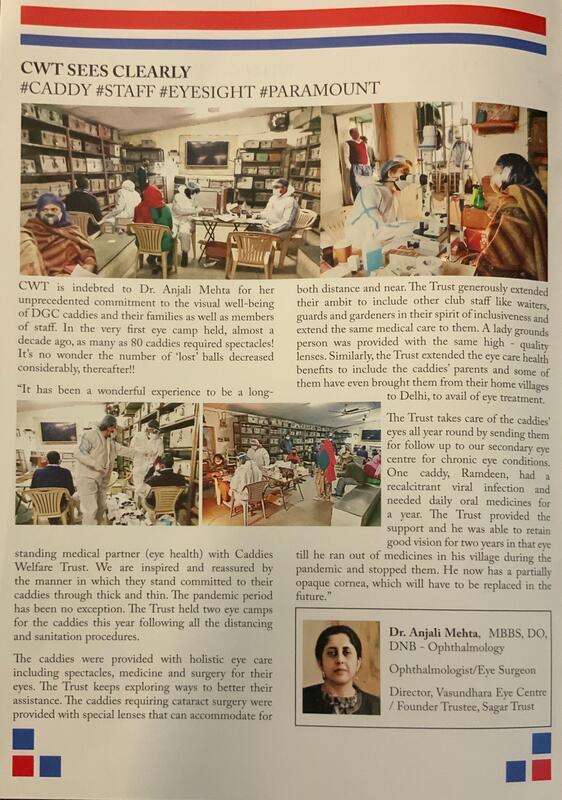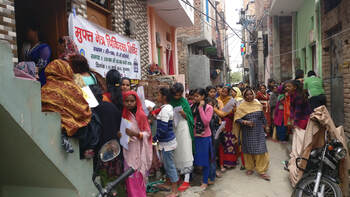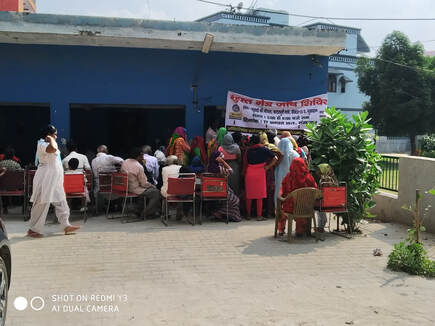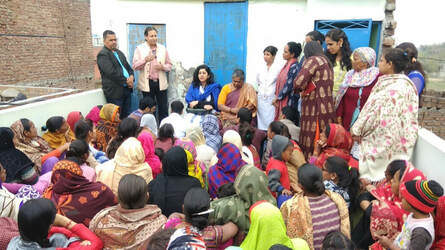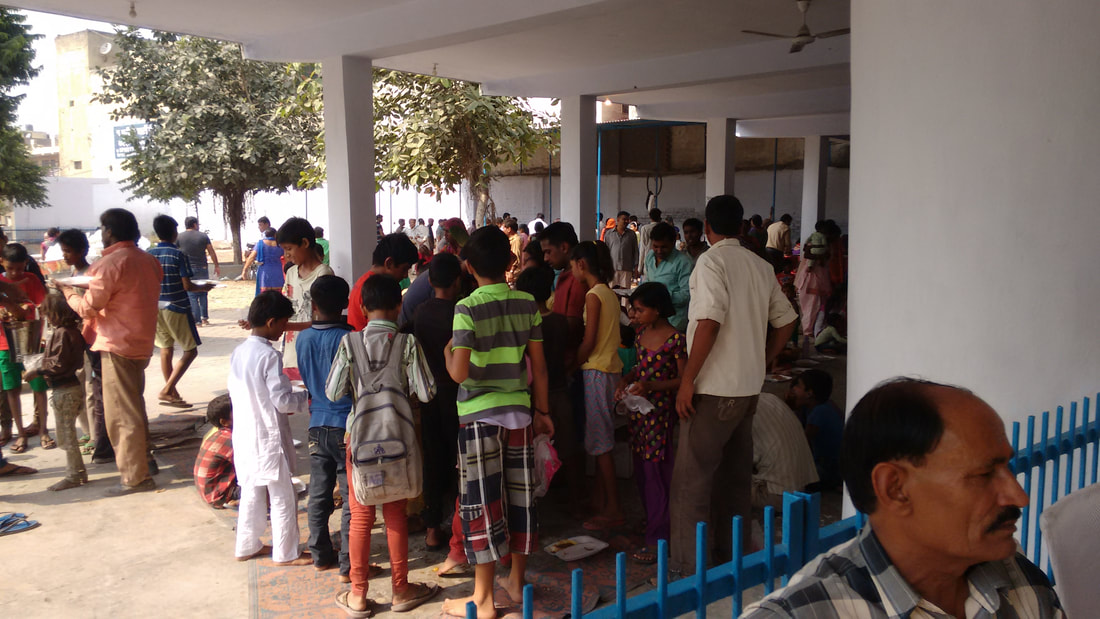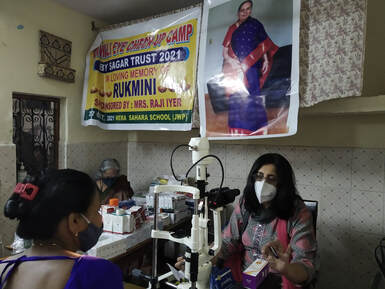Special Projects
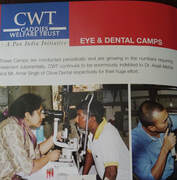
Our special projects are with diverse marginalized groups- largely in Delhi/NCR (as better follow ups are possible for the patient) and also a few in the adjoining states.
1. ABEM
Sagar Trust partners with the Swiss family of Abem. Abem was a much loved grandmother who adored children. This project was started in her memory by Marie (granddaughter) and Gautam Prasad. Under this project economically underpriviledged children under 18 are treated free of cost, including hospital stay for their various eye ailments. The treatment costs are borne by Abem's family. This project has been underway since December 2014.
Through our ABEM project for children we reach underpriviledged children like Zoya (name changed). She had bilateral cataracts at the age of 11 and was unable to walk when she visited us. We supported her with bilateral cataract surgeries that helped her gain useful vision, physiotherapy to make her lower limbs strong, and educational resources.
2. Caddies Welfare Trust
Sagar Trust partners with the Caddies Welfare Trust (CWT) to provide year round ophthalmic care for the daily wage earning caddies of the Delhi Golf Club. The CWT is a pan India Trust meant to cater to caddies across the country with respect to their health, financial and educational needs. The CWT activities provides significant security as most caddies are daily wage earners with an income of less than Rupees 10,000 a month. Eye camps are held annually in the caddies hut. Any caddy needing eye related treatment or surgeries follow up with us throughout the year. This treatment is paid for by the Caddies Welfare Trust. The project has been underway since 2014.
3. Outstation camps : Uttar Pradesh (Sri Aurobindo Aradhana Trust, Bangalore branch) Uttarakhand (CRY) Sahibabad ( Dr Dolly Tandon Chopra)
Bijnore in Uttar Pradesh has the highest prevalence of blindness @ 3.6% and visual impairment @21.82%.
In 2010, partnering with Sri Aurobindo, Aradhana Trust, Bangalore branch Sagar Trust did the first ever large eye camp in Bijnor. Over a hundred cataract surgeries were performed over two days by Col KC Gupta and Dr Anjali Mehta. The overall administration and organization of the camp and surgeries on such a large scale was orchestrated by my late batchmate, Dr Rajeev Vishnoi, consultant WHO.
In 2013, a second large eye camp was organised in Bijnor by Sri Aurobindo Aradhana Trust, Bangalore branch. Sagar Trust served 500 OPD patients and carried out 24 eye surgeries.
Subsequently, late Shri Anwar from Bijnor acted as the liason betwen the Bijnor community and Sagar Trust, often enabling people from Bijnor to avail of free surgery at our centre in Delhi by escorting them. With the untimely demise of Shri Anwar, a precious partner was lost, though we still occassionally get patients from Bijnor. We hope to return to work there someday.
We also partnered with CRY for an outstation camp in Sunoli in Uttarakhand and with Dr Dolly Tandon Chopra (now residing and working in Ranchi) in Sahibabad
4. Sahaj Sagar Trust
Sahaj Sagar Trust has established a weekly charitable medical clinic at Carterpuri Village Gurgaon. This is run free of cost by the wives of retired air force officers in Gurgaon. Sagar Trust takes care of the ophthalmic needs of the immigrant and labour population attending this clinic. Eye Camps are held at Carterpuri village and those requiring treatment of surgery follow up with us at our eyecentre. The cost of treatment is borne by the Sahaj Sagar Trust. This project is underway since 2013.
5. ONGC Project -looking after the sex workers and their families in the GB Road community
We had a one eyed young girl patient in our clinic who had come to us with symptoms of photophobia (aversion to light) in her only seeing eye. This is a common symptom in eye diseases. However, we could not find anything wrong with her eye. Her history led us to the clue. She had been rescued from a brothel some time ago and was being sheltered with an NGO. We realized that she had been in darkened rooms for so long that even normal light seemed too muchh for her eye. Her problem got ameliorated with a simple photochromatic glass. We thought there must be many other such patients and we thought of helping others like her. This prompted us to go and work in The GB Road area of Delhi where many women and girls are forced into trafficking against their will. We were able to do this when ONGC decided to support this idea.
Our project is different from the 'raid and rescue' models earlier prevalent in GB Road.
We have stayed there for the long term with our local partner, SPID, building support networks, encouraging sex workers to travel out confidently and inviting outsider visitors to our camps to lessen their prejudices. We have been there since 2016 and have conducted 18 main eye camps (and 15 follow up), reaching out to over 1700 people in the GB road community of sex workers and their extended families.
Under the project eye camps are held regularly in GB road thus bringing ophthalmic care to the very doorstep of the sex workers community. In addition to ophthalmic care, other medical needs and social challenges are determined and relevant doctors and counselors invited to the camps to mitigate these. Lobbying at strategic levels for social issues and specialized care is also provided .A white paper on the project has been published. We also liased with NGOs working on trafficking in Bengaluru and exchanged notes and ideas. Several phases of this project in GB Road have been conducted from 2016 -2023
Overall, we continue to provide quality eye care and also holistic health services including mental health, physiotherapy, medical and laboratory investigations free of cost at the doorstep of the GB road community. We also facilitate referrals and follow ups at hospitals free of cost when advanced care is required. We follow strict sanitation and hygiene protocols and use the opportunity to educate patients about Covid as well as distribute sanitation materials. Details of the projects are as follows :
- ‘Providing high quality ophthalmic care free of cost to sex workers and their families in GB Road, Delhi.’ This project was sponsored by ONGC 2016-2017.
Overall, the project has been a rewarding experience especially watching the local people gain in confidence and travel out freely to avail of facilities at our center. Some of our colleagues who visited the GB Road area also learnt more about the lives of the inhabitants and were able to rid themselves of certain prejudices. We have been fortunate to find nice partners like SPID, Kat Katha and Anganwadi workers and have developed a warm relationship with them as well as the patients, many of whom have become regulars at our camps, seeking replenishment of medicines that they found useful.
- ‘Expanding the health care provided to sex workers and their families in GB Road, from ophthalmic to comprehensive care and introducing best practices from around the country into GB road, Delhi.’ This project was sponsored by ONGC in 2019.
With the completion of Phase 3 have screened a total of 536 patients, provided 332 spectacles and conducted 5 surgeries. Additionally, diagnosis supporting lab tests have also been conducted. The overall medical health and mental health of the local population of GB Road attending these camps was also looked after at some of these camps. We have had a meeting with NGO’s working in the field of trafficking in Bengaluru and exchanged ideas on best practises and local prevalent customs such as the Devadasi system.
- ‘Financial support for helping sex workers and residents of the red- light areas of Delhi incorporate Covid hygiene into their lives and providing them with quality eye care, gynaecological and mental health support.’
- The project ‘Financial support for helping sex workers and residents of red-light area of Delhi, and providing them with quality eye-care’n has been successfully completed. In total 6 eye camps have been completed, we have screened a total of 719 patients, and provided 450 spectacles. Several patients have also received follow-up treatment, as well as general medical and wellness advice. The overall objective was to improve the health of the people in the GB Road area and develop networks of health care for them. This project was sponsored by ONGC in 2023
6. BPCL Project - attending to the eye care and social challenges of marginalized women
Even at the best of times, women have lesser access to good healthcare facilities due to financial, administrative and gender issues. We often find ladies of lower socioeconomic groups coming to us with advanced diseases. This may be for a variety of reasons-the family sometimes prioritizes the heath of male members ;women tend to neglect themselves; some in an abusive relationship become timid and lose confidence, and are unable to assertively seek health care unless the issue is serious. Some elderly women are dependent on younger family members to escort them to clinics, who may be very busy in their work. We therefore felt the urge to go regularly to the doorstep of marginalized communities so that they can easily avail of quality medical care at no cost, at a place just a few metres away.
Nithari village was in the news when there were a series of child killings which had instilled fear in the local community. NGOs had stepped in to help in those days and there are schools and skilling centres for the underpriviledged community.Many resttlement colonies like Savdha Ghevra area have several clusters of colonies with semi-permanent roofing and crowded lanes with drug problems.
BPCL is a highly regarded and admired Public Sector Unit (PSU). Through this project, Sagar Trust reaches out to marginalised women residing in areas of NCR such as Savdha Ghevra, Vikas Nagar, Nithari Village - NOIDA and others. This project has been underway since 2019.
We made many discoveries during these camps. Some women in resettlement colonies were amazed to find how well they could see by simply giving them spectacles. A few had never visited an eye doctor and did not realize that their sight had a margin for improvement-thinking that everyone must be having vision like this ! We found groups of women who never had the luxury of time to themselves on any day as they were constantly doing chores or looking after others' needs and we arranged a motivational speaker to help them realize that they must tap into their own dreams and desires for a few minutes everyday. We helped with diverse social challenges ranging from drugs to mental health issues.
